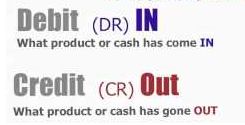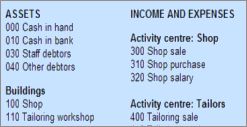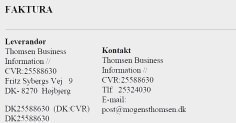Fritz Sybergs Vej 9
DK 8270 Hojbjerg
Scandinavia
info@dynamicbusinessplan.com


Mis-entry in the books
Inevitably, you will make occasional mis-entries to the effect that you will have to correct your accounts.
Corrections are also called post entries or adjustments.Post entries or adjustments
Certain entries that are not usually entered in the day-to-day bookkeeping but
posted at periodic intervals (e.g. on closing of the annual accounts), are
called post entries too.
Similar to all other entries, post entries must be supported by a numbered
voucher. Moreover, such entries should be posted with a paper voucher explaining
the adjustment. However, in most cases, the text you enter in the accounts
serves as explanation and a paper voucher will not be necessary.
An example:
Problem:
You have two customers, both named Vijay Jain. More specifically: Vijay A. Jain
and Vijay B. Jain. Accidentally, you have entered (credited) a payment received
by Vijay A. Jain to Vijay B. Jain ´s account. Now you need to correct the
mistake.
Solution
You correct the mistake by debiting (cross entry equaling the mistake) the
payment to Vijay B. Jain ´s account and crediting the payment to Vijay A. Jain
´s account.
Originally, the payment was debited to your bank account. You do not have to
adjust your bank account as this isolated part of the original entry (charge)
was correct.
This type of adjustment does not need a paper voucher. It is sufficient to refer
to the original entry in the text of the post entry.
An adjustment is entered by the same date as the entry it supersedes.
Occasionally, you see post entries entered at a later date, but this is a bad
habit causing errors or confusion at best.
Consistent errors, please
A golden rule is: if you have a tendency of making mistakes, at least be
consistent! In other words: If you have doubts about the handling of a certain
type of entry, then do it the same way each time.
If a certain type of entry has consistently been entered to a wrong account is
it subsequently fairly easy for an accountant to correct the mistake. However,
if the same type of entry has been entered in different ways (one may be the
correct way), then it could be very time consuming to correct.
Go to next business issue: Re-posting a Voucher

It has been my experience that competency in mathematics, both in numerical manipulations and in understanding its conceptual foundations (accounting), enhances a person’s ability to handle our day-to-day financial decision-making.
Alan Greenspan, American economist.




































